Official Charts 70th Anniversary: The Official Top 10 best-selling singles from the 1960s
From The Beatles to Ken Dodd, these are the ten songs that defined the 1960s.

As the Official Charts Company celebrates the 70th anniversary of the UK's only Official Singles Chart, we've opened the vaults and crunched the numbers to reveal the Top 10 biggest singles of each successive decade following the birth of the Official Singles Chart in 1952.
We're going to be taking a look at the defining hits of the 1960s, 70s, 80s, 90s, 00s and 10s. First up, the 1960s - a decade which saw the success of British music absolutely supernova into a global force, thanks to emergence of The Beatles. Four fresh-faced boys from Liverpool that set the tone, pace and feel for modern pop music.
As such, it comes as no surprise that John, Paul, George and Ringo absolutely dominate the list of the biggest singles of 1960; with a total of five entries in the Top 10.
So, without further ado, let's get into it. These are the Official Top 10 biggest singles of the 1960s.
Disclaimer: This is a list of the best-selling singles released from 1960-1969, compiled from Official Charts Company data representing pure, physical sales from 1960 - 2022.
MORE: The Beatles' Official Charts history in full
10. Green, Green Grass of Home
Artist: Tom Jones
Released: 1966
Official Singles Chart peak: Number 1
Total UK sales: 1.27 million
Tom Jones' bolstering ode to his hometown of Pontypridd deep in the South Wales valleys remains a heart-swelling testament to the roots and family we may leave behind, but always yearn to come back to.
It was the second UK Number 1 single for the Welsh crooner; following It's Not Unusual (1965) and preceding the later charity single Island's In The Stream with Ruth Jones and Rob Brydon (credited as their fictional Gavin & Stacey characters Vanessa 'Nessa' Jenkins and Bryn West), and the Bee Gees' Robin Gibb.
View Tom Jones' Official Charts history here.
9. It's Now Or Never
Artist: Elvis Presley
Released: 1960
Official Singles Chart peak: Number 1
Total UK sales: 1.28 million
The original release of this classic Elvis ballad was delayed in the UK by several months following copyright issues, leading to an increased demand so that when the track finally arrived, it shot straight to Number 1 and stayed there for eight weeks.
It's Now Or Never returned to Number 1 on the Official Singles Chart for one week in 2005, after a re-issue campaign, gifting the King his 21st UK Number 1.
View Elvis' Official Charts here.
8. Release Me
Artist: Engelbert Humperdinck
Released: 1967
Official Singles Chart peak: Number 1
Total UK sales: 1.39 million
A cover of a track originally issued in 1949 by Eddie Miller, Release Me was Engelbert's first UK chart-topper (he would follow this up with his second and final, The Last Waltz, the same year). In fact, it was Engelbert Humperdinck who became the first ever solo artist in British chart history to achieve million-selling status with two different singles.
Fun chart fact: During it's time at Number 1, Release Me blocked another release by the Beatles, Penny Lane/Strawberry Fields Forever, from reaching the top of the chart, ending the Fab Four’s track record of 11 consecutive Number 1 singles.
The Hump later went on to represent the United Kingdom at the 2012 Eurovision final at age 76. Pictured below in London ten days before the ceremony being retrospectively presented with his Number 1 Awards from the Official Charts Company for Release Me and The Last Waltz. (credit: Official Charts Company).

View Engelbert Humperdinck's Official Charts history here.

7. We Can Work It Out/Day Tripper
Artist: The Beatles
Released: 1964
Official Singles Chart peak: Number 1
Total UK sales: 1.41 million
The first and by no means last appearance by the Fab Four on this list, this was a double A-side release comprising the singles Work It Out and Day Tripper.
We Can Work It Out specifically is looked upon by Beatles fans as a rare example of collaboration between the group's two songwriters, Paul McCartney and John Lennon, in a manner exemplified with their 1963 hit singles. During the early years of the band, duties were more or less split equally with the billing of Lennon-McCartney, before in the band's latter years, it became common for songs to receive minimal input from one side of the duo, while still retaining shared credit, which would continue for the length of their partnership.

The Beatles, captured in 1968 (Image: Keystone/Shutterstock)
6. I Feel Fine
Artist: The Beatles
Released: 1964
Official Singles Chart peak: Number 1
Total UK sales: 1.43 million
A great example of the working of the Lennon-McCartney partnership, I Feel Fine was composed entirely by John Lennon, with the guitar riff being composed as the group recorded Eight Days A Week.
I Feel Fine is also one of the earliest examples of the use of feedback during recording, instead of just during live performances. In one of the last interviews he gave before his death, Lennon said of the song: "I defy anybody to find a record – unless it's some old blues record in 1922 – that uses feedback that way."
View John Lennon's Official Charts history in full now.
5. The Carnival Is Over
Artist: The Seekers
Released: 1965
Official Singles Chart peak: Number 1
Total UK sales: 1.43 million
The Seekers were an Australian folk-pop quartet, formed in Melbourne in 1962. The first major Australian recording group to find chart success in the UK, The Seekers' biggest, and signature, song is The Carnival Is Over, an English-language cover of a classic Russian folk song about the Cossak general Stenka Razin.
Emerging in the 1880s, it covers a story from the Russian Peasant Uprising (fun!) in 1670, in which Razin allegedly killed a Prussian Princess whom he held captive (fun!!). The Carnival Is Over was The Seekers' second and final UK Number 1 single.
View The Seekers' Official Charts history in full here.
4. Tears
Artist: Ken Dodd
Released: 1965
Official Singles Chart peak: Number 1
Total UK sales: 1.52 million
Yes, beloved, late comedian Ken Dodd had a UK Number 1 single, Tears was the best-selling song of 1965 and went on to become the fourth-biggest song of the decade.
Tears comes from a time when Dodd had a very successful career as a musical recording artist, before he pivoted to comedy. It's a cover of a 1930s standard that had been recorded countless times before. It was Dodd's only UK Number 1 hit, but he had a further three Top 10 entries, and 18 Top 40 hits overall before his death aged 90 in 2018.
View Ken Dodd's Official Charts history in full here.
3. Can't Buy Me Love
Artist: The Beatles
Released: 1964
Official Singles Chart peak: Number 1
Total UK sales: 1.55 million
And now we step into The Beatles' total dominance of the Top 3 singles of the 1960s; a fitting tribute to the first pop supergroup, that helped to re-write music in their image.
Can't Buy Me Love was the sixth single issued by the Beatles, taken from their third album A Hard Day's Night. It's an important evolution in the growth of the group, as the first Beatles album that was entirely written by Lennon-McCartney.
2. I Want To Hold Your Hand
Artist: The Beatles
Released: 1963
Official Singles Chart peak: Number 1
Total UK sales: 1.82 million
Come on, you know this one. The first Beatles song to reach Number 1 in America, I Want To Hold Your Hand was initially blocked from the top by another Fab Four record (more on that down below), but once it settled in at the top of the Official Singles Chart, it stayed there for five weeks.
I Want To Hold Your Hand is generally regarded as the song that kickstarted the Beatlemania movement; initially thought upon as a novelty record by our American friends, The Beatles' dedication to experimentation with the pop form would go on to help re-define the very notion of what popular music was and, let's be honest, still is. Electrifying, potent and highly listenable, even 60 years on.
1. She Loves You
Artist: The Beatles
Released: 1963
Official Singles Chart peak: Number 1
Total UK sales: 1.93 million
She Loves You is not just the biggest-selling single of the 1960s, its also still the biggest-seller by The Beatles.
It helped usher The Beatles into superstardom in their native UK, as well as breaking sales records at the time, it being one of five singles by the group to dominate the Top 5 of the Official Singles Chart at the time.
The song's refrain of "yeah! yeah! yeah!" is perhaps one of the most overlooked contributions by Lennon-McCartney in the pop canon. Listen to most popular music, and you will hear a refrain or ad-lib of the word "yeah," and that all started here. It can mean many things, an outburst of emotion, of joy or frustration. And that all started with four lads from Liverpool. And that, really, is what pop music is all about.
The Official Top 10 biggest singles of the 1960s
| POS | TITLE | ARTIST | PEAK | YEAR |
| 1 | SHE LOVES YOU | THE BEATLES | 1 | 1963 |
| 2 | I WANT TO HOLD YOUR HAND | THE BEATLES | 1 | 1963 |
| 3 | CAN'T BUY ME LOVE | THE BEATLES | 1 | 1964 |
| 4 | TEARS | KEN DODD | 1 | 1965 |
| 5 | THE CARNIVAL IS OVER | THE SEEKERS | 1 | 1965 |
| 6 | I FEEL FINE | THE BEATLES | 1 | 1964 |
| 7 | WE CAN WORK IT OUT/DAY TRIPPER | THE BEATLES | 1 | 1964 |
| 8 | RELEASE ME | ENGELBERT HUMPERDINCK | 1 | 1967 |
| 9 | IT'S NOW OR NEVER | ELVIS PRESLEY | 1 | 1960 |
| 10 | GREEN, GREEN GRASS OF HOME | TOM JONES | 1 | 1966 |
©2022 Official Charts Company. All rights reserved.
Article Images: Keystone/Shutterstock
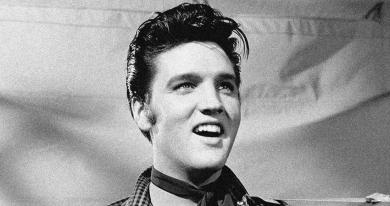
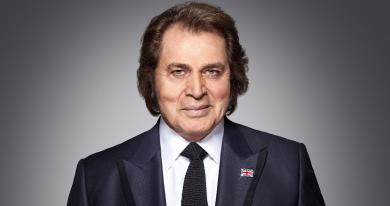
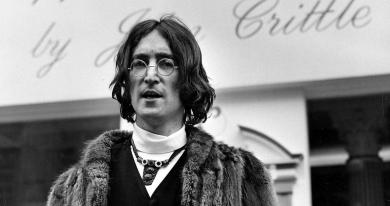
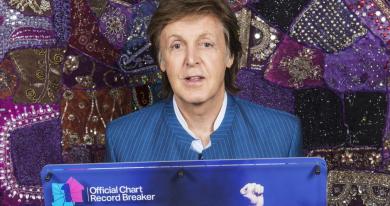
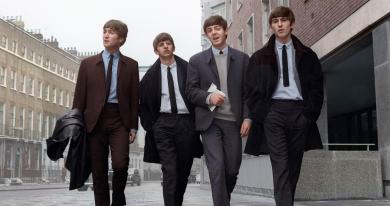


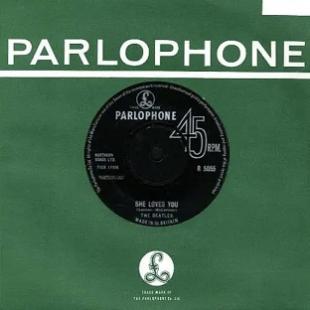

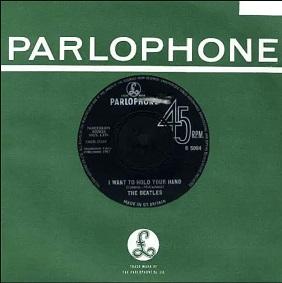

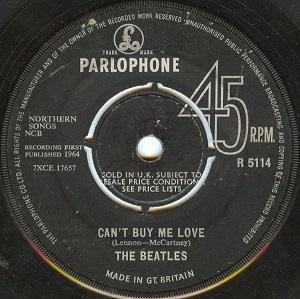


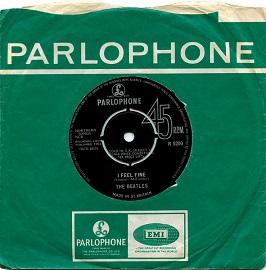

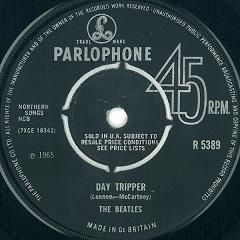
Join the conversation by joining the Official Charts community and dropping comment.
Already registered?
Log in
No account?
Register
David Eve
Also why aren't you looking at the 50s? Is it because it's not the full decade?
Laurence Sully
The Beatles had a run of 11 straight chart toppers and a 2nd run of 6 had it not been for Engelbert Humperdinck interupting their 1st run as ''Penny Lane/Strawberry Fields Forever'' stalled at number 2 for three weeks - without Engelbert the moptops would probably have reached 18 straight with ''Something'' only making number 4 in 1969 - this would have made a grand total of 72 weeks at the summit ! - if you look carefully at ''She Loves You'' it spent 6 weeks at the top 6 weeks at No 2 & 6 weeks at No 3 - Spooky huh ? ...
David Eve
Of course this is overlooking the fact that Please Please Me was no.1 on every chart (NME, Melody Maker, Disc and the BBC chart) except for the inferior but 'official' Record Retailer chart so it's really 12 straight toppers....
Also on the Melody Maker Chart (probably the most superior based on number of dealers that contributed), Penny Lane/Strawberry Fields Forever did reach no.1...
Laurence Sully
Equally ''Twist And Shout'' wasn't included as it was an E.P. but ''Magical Mystery Tour'' (a Double E.P.) was - but outsold by ''Hello Goodbye'' - the plot thickens ...
Bengy
"... representing pure, physical sales from 1960 - 2022."
So are downloaded sales included?
So is a download a pure physical sale?
JC
John Cooley
To me they shouldn't be, unless the sales price was the same price as a vinyl record. Which in most cases they aren't.
Lauren Kreisler